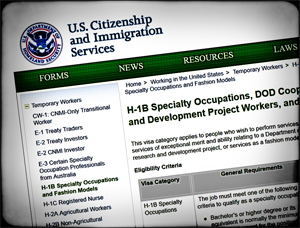Given the extensive abuse of H-1B workers, often Indian nationals being kicked around by others of Indian extraction, as reported in our prior blog, what can be done to minimize this problem when it comes to government contract work?

The Center for Investigative Reporting has just published a series showing how a population, largely of Indian nationals, has been pushed into "indentured servant" status despite their levels of education and expertise. The H-1B workers are, as CIR indicates, often cheated at every turn financially and essentially chained to their jobs for years at a time. Many of these workers, CIR says, are working on government contracts.
It strikes me that there are two completely different potential approaches to this problem: a ground-up strategy, and a top-down one. Let's deal with ground-up first.
As one who was aware of, and sympathetic to the civil rights struggles of the 1960s, without having been an activist, I am drawn to the parallel of how the long-abused African Americans organized themselves into a powerful political movement that led to the March on Washington, and the passage of a series of significant civil rights bills. There was serious support from white liberals and northerners, but it was the gutsy work of the southern African-Americans that made all the difference.
Why is not at least a modest version of that going on now in the H-1B victim community? I pay pretty close attention to H-1B matters and have yet to hear even a whisper of Indian victims organizing to change matters, notably within the outsourcing firms, or Indian body shops.
Perhaps I am wrong about that, and would welcome a correction.
And why has not the AFL-CIO figured this out and helped create such a movement? It strikes me as a perfect opportunity for the union leadership to break out of their slumber and win one for their cause. If the organizing were initially concentrated on IT people working on government contracts, it would give the organizers extra leverage to bring about better wages and working conditions for the H-1Bs involved.
I could visualize the unions hiring several Indian immigrants with green cards or U.S. citizenship, all IT professionals who had previously worked with the big body shops, like Infosys or Tata; the unions would then find some left-wing money to fund an advocacy group, as Ford Foundation money created and supported La Raza 40 years ago, and would hire some lawyers to protect the H-1B workers' rights.
In such a setting a young Mahatma Ghandi or Raul Yzaquirre could rise, and change the whole scene.
My own motives, of course, are multiple here, as such a movement would make employers less enthusiastic about H-1B, and perhaps lessen the pressures to expand the program, which would have the pleasant side effect of opening some jobs for U.S. workers, and raising wages for everyone in this prosperous industry.
Here's a top-down strategy that should appeal to the White House, if they really want to make life better for some migrants — even though the H-1B target population is here legally.
It might not take legislation, but it would take political will, something in short supply. It would apply to H-1B-dependent employers, a class already established in the law; these are the firms that primarily hire H-1Bs, rather than citizen or permanent resident workers.
Here's the scene: the government is about to sign a contract with an IT firm for some big job. The contracting officer and the would-be contractor are sitting down to work out the final details. The contractor (and I have been in this situation on a very small scale) wants the job very much and is willing to make any last-minute adjustments the government wants.
The contracting officer then announces that there has to be a half of 1 percent set aside from the total dollar amount, to be sent to the U.S. Labor Department to audit and enforce the terms of the contract and to make sure that the contractor meets the usual labor standards. Take it or leave it, the officer says. Or maybe the half of 1 percent is added to the total contract.
Suddenly there is no shortage of resources to enforce the terms of the contract. The money is not concentrated in an enforcement agency, where it might be vulnerable, but spread through all the contracting agencies.
But is there a shortage of will to impose those conditions? I worry about that.
Again, the happy by-product would be that the employer would suddenly find that using the H-1B program was not so profitable as before; and anything done to lessen the attraction of H-1B to employers is good for everybody else.
